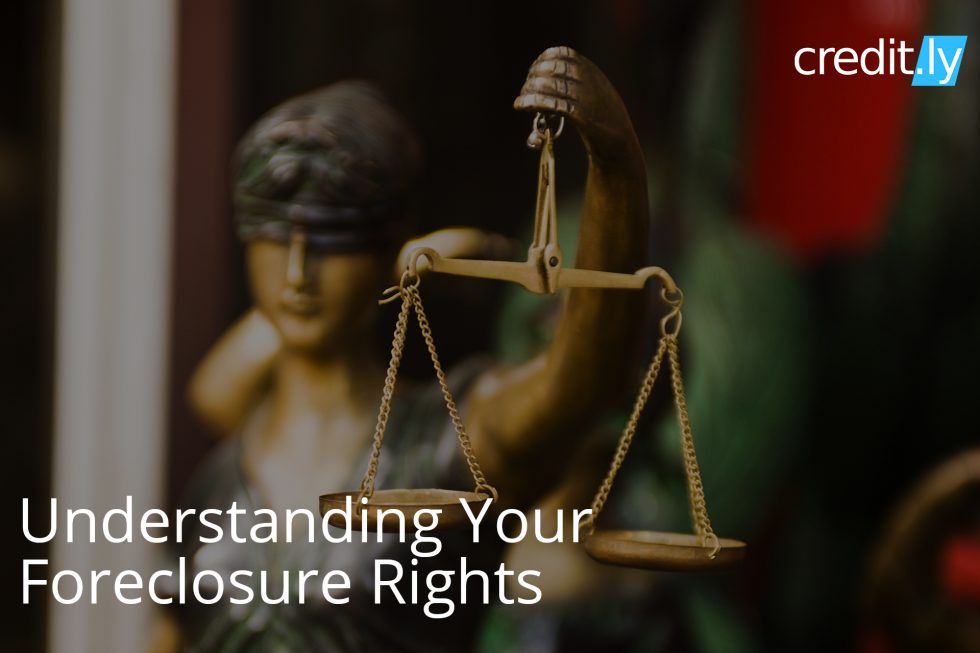You’re in trouble financially, and you’ve fallen behind on your mortgage payments, the threat of foreclosure is real. This reality should not be ignored because the prospect of losing your home, can easily become overwhelming. As a result, struggling homeowners may feel inclined to simply turn a blind eye to the proceedings and accept their fate. It’s important to remember that when it comes to foreclosure, you have do have rights. And understanding them can play a key role in keeping your home. Or at the very least, mitigating the damage done to your credit and overall financial health.
For instance, Lenders are required to abide by state laws. Most states stipulate that homeowners be provided with a written notice of default. This is essentially a formal declaration that you’re behind on payments. And this is in breach of your loan contract. Also, plus a certain amount of time to remedy the situation. Let’s review in-depth what foreclosure means. And review what rights and recourse you may have when faced with one.
What Does Foreclosure Mean?
Here is our foreclosure definition: Foreclosure is a legal process where a creditor (i.e., a lender or mortgage holder) can repossess or sell property for the purpose of repaying the debt owed on that property. Mortgage holders can foreclose on a property any time after the borrower starts to miss payments on the mortgage, unless otherwise set out in the mortgage or in the state where the property is located. State laws vary.
Foreclosure involves the following steps:
- The mortgage holder gives the defaulting homeowner a written notice of default. A written default of notice is a letter providing formal notice that the mortgage holder has fallen behind on their payments and is in default.
- Secondly, the homeowner is given a limited period of time where they have a chance to cure the default. And pay all amounts due. This includes interest, penalties, attorney charges and any other fees allowed by the law or the mortgage.
- Thirdly, the lender may pursue judicial foreclosure (which involves filing a lawsuit in a court) or non-judicial foreclosure depending upon the laws of the state where the property is located. Some states allow for both:
- For instance: California allows for a non-judicial foreclosure process or a judicial foreclosure process. Though the nonjudicial foreclosure process is more commonly used in the state, according to its judicial branch.
- If the time allowed for the homeowner to cure the default has passed, the mortgage holder will probably give notice of a foreclosure sale.
- The property may be sold at a public auction where the highest bidder can purchase the property, or the lender may purchase the property and sell it later in a private sale.
- An unlawful detainer suit will be filed to evict the property owner if he is still living on the property after the sale.
The length of time a foreclosure process takes can vary significantly. State laws and the mortgage holder’s motivation are two major factors. In many cases, the foreclosure process will start three to six months after they’ve missed their first payment.
Will a Foreclosure Action Wipe Out All of Your Debt?
Foreclosure actions wipe out some of the property owner’s debt, like the original mortgage (taken out at the time of purchase), home equity loans (HELOCs), and second mortgages. However, property owners are still obligated to pay HELOCs and second mortgages off in full if they are not paid out of the foreclosure proceeds.
In markets where there has been a significant drop in real estate prices, some properties will be sold for less than the balance owed on the original loan. If there is no insurance protecting the mortgage holder (e.g., private mortgage insurance, or PMI) for the difference between what is owed on the property and what it sold for, a court could enter a deficiency judgment against the property owner. Deficiency judgments obligate the property owner to repay the difference and give mortgage holders the right to collect the remainder of the debt owed from any other assets the property owner may have.
A Lender’s Legal Obligations in a Foreclosure
In most states, mortgage holders or lenders have two primary obligations:
- Notice: In most states, the most important part of the foreclosure process is to provide notice to the property holder. In these states, lenders are required to:
- Provide a homeowner with sufficient notice. This is to allow the property owner to understand that he is in default.
- Provide notice of the property owner’s right to cure the default. This is before the lender can initiate a foreclosure proceeding.
- Written claims (proof of money owed under the mortgage): Lenders also are usually required to file statements which itemize the amount the property owner owes under the mortgage. The amount owed includes the principal, interest, late charges, attorney fees. It also includes any other charges the lender is permitted to charge under the terms of the mortgage. Or the laws of the state where the property is located. In many states, lenders do not have to send a claim to the property holder.
- Soldiers’ and Sailors’ relief: Lenders are also required to certify in writing that the property owner is not a member of the armed services before initiating a foreclosure action. The Soldiers’ and Sailors’ Civil Relief Act is intended in part to protect deployed active duty service people. If you are a member of the armed services, you should consult an attorney about your rights, as they concern foreclosure proceedings.
What if the Lender Is Wrong?
If you think your lender made a mistake: Because you did not default on your loan. Or the amount the lender is claiming is incorrect. Contact the lender and explain in writing why you believe the lender is mistaken.
Be sure to explain clearly why you are not in default. And provide copies of any documents that prove your position. Even if your lender does not agree, you have the right to go to court and prove that you did not default on your loan. If you go to court, the documentation you send to the lender will be very important. You may wish to consult with legal counsel to handle any court appearances and documentation.
Can I Stop a Foreclosure? What Legal Ways Exist to Stop or Prevent a Foreclosure?
There are basically two legal ways to challenge or defend against a foreclosure.
Technical defenses are defenses to the foreclosure proceeding itself. One example of a technical defense is when a property owner is not given adequate notice of the default and proceedings. However, technical defenses are not very helpful in preventing foreclosures because a mortgage holder can easily defeat the defense by correcting the procedural defect. In the example of lack of adequate notice, a mortgage holder can defeat the defense by issuing a new default notice and beginning the proceedings over again.
Substantive defenses are the best legal way that a property holder can stop a foreclosure. Substantive defenses go to the terms of the mortgage itself. Here are some examples of substantive defenses to the foreclosure process:
- If you are really not in default and the debt and interest have been paid on time (according to the terms of the mortgage).
- The mortgage holder committed fraud in obtaining the mortgage.
- The property owner files for bankruptcy. A bankruptcy filed before the foreclosure sale will “stay” or temporarily stop a foreclosure.
- A property owner can stop a foreclosure process if he or she pays off the loan and all of the lender’s foreclosure expenses and costs.
If you believe you may have a legal reason to stop the foreclosure, you need to file an objection to the sale with the court. In most states, you can file objections before the foreclosure sale takes place, after the sale takes place, or before the court ratifies the sale, if the sale was improperly conducted.
Practical Suggestions for Stopping a Foreclosure Sale
- Find out the exact details of what the lender believes you did or did not do. Ask the lender what you can do to remedy the default. Some lenders will work with you, so it doesn’t hurt to ask.
- Pay the mortgage holder any loan payments you are behind on together with any interest, fees or late charges incurred by the mortgage holder. Although this is the most difficult thing to do since you are already in default because you haven’t made timely payments, this is the best way to prevent foreclosure proceedings.
- If possible, try to work out a compromise that will stop the foreclosure proceedings. This may allow you to stay in your home and protect your credit score. It never hurts to ask your mortgage holder if you can reach a compromise. Ask:
- If the lender will agree to lower your payments and allow you to pay over a longer period of time.
- If the lender will lower your payments in exchange for raising your interest rates, adding a point.
- And if you can refinance the loan at a lower interest rate in order to reduce your payments.
- Sell your home so you can keep more of the equity. Locate a real estate agent that is familiar with foreclosure investing.
- Volunteer to give the house back to the lender. (For more on this topic, see “Deed in Lieu of Foreclosure” in the Glossary).
- You may be able to postpone the proceedings one time, for one day, if you make a good argument in writing that you can obtain the cash.
Tax Issues Need Attention
There are tax consequences for a foreclosure. When a debt is forgiven in a foreclosure action, taxpayers are considered to have made money. That means that the taxpayer or property owner not only loses the property but also may owe taxes. They may owe taxes on the difference between what was paid for the property. (The value of the home.) And what is owed on the mortgage. (But forgiven in the foreclosure action.)
Credit Issues Can Be Fixed
Foreclosure, be it voluntary or involuntary, can be very damaging to your credit. Your mortgage records will be marked as in foreclosure, and these records will remain on your credit files for seven years. A mortgage foreclosure is nearly as damaging as a bankruptcy filing and will have a significant impact on your ability to borrow in the future. You can minimize the impact of a foreclosure by continuing to use your other credit and loan accounts responsibly.
Credit.ly Tips:
- Do NOT bury your head in the sand and ignore any written communication from your mortgage lender. Respond to any notice you receive as soon as you get it. Find out the exact details of what the lender believes you did do, did not do, and ask what you can do to remedy the default. Act quickly!
- Find a lawyer to represent you when negotiating with lenders — it will ensure the best possible outcome.
- If you can, reinstate the loan and pay all of the loan payments and lender’s costs.
- Filing for bankruptcy should be your last resort. Most homeowners who declare bankruptcy end up losing their home to foreclosure anyway. And will end up with the bankruptcy and foreclosure on their credit report. If you need to file for bankruptcy, contact a bankruptcy attorney. Be aware that you still may lose your house and you will have damaged credit for at least seven years.
- There has been fraud related to foreclosure assistance for consumers. Avoid companies that:
- Claim they are mortgage consultants
- Ask for an advance fee before they are able to perform any service for you
- Claim they can stop the foreclosure proceeding if you are in default and will rescue your property
- Take over your house at a discount
- Tell you to pay the company instead of your lender
- Tell you to transfer your deed to the company
- Claim they will give you a good deal
Always check the validity of the company with your state’s attorney general.
(To find your attorney general, you can visit: www.naag.org.)
- Never make a verbal agreement; always get it in writing.
- Refrain from refinancing your mortgage several times in a short period of time. Each time you do this your lender will charge you additional fees, refinance charges and points. All of the refinance expenses and fees will be used in calculating the annual percentage rate (APR) of your loan, so you may pay a higher interest rate.
Understanding Your Foreclosure Rights – Glossary
Acceleration Clause
Most mortgages have acceleration clauses which allow the mortgage holder to declare that the entire debt is due and payable as soon as you default on a payment. For example: If you have a mortgage on your home for $75,000 and you fail to make the monthly payment. The lender can demand that you pay the full amount owed or $75,000 immediately as soon as you miss one payment. If a mortgage does not have an acceleration clause, the lender can begin foreclosure proceedings. As legally permitted in the state where the property is situated.
Deficiency Judgments
As a mortgagor, you are required by law to pay mortgage insurance (e.g., PMI) for the length of time your first mortgage is more than 80% of the value of the property. In a real estate market where housing prices drop, it is possible that the property could be sold for less than the balance on your loan. PMI will not cover this deficit, so a lender may ask the court to enter a deficiency judgment against you. A deficiency judgment gives the lender the right to collect the difference from your other assets unless the loan is considered a non-recourse loan.
Foreclosure by Judicial Sale
A foreclosure by judicial sale is the most common method of foreclosing on real property. A foreclosure by judicial sale is a process supervised by the court where property is sold. The proceeds of the sale go in order to (1) the lender to satisfy the terms of your mortgage, (2) other lien holders, and (3) the mortgagor of the property if there is anything left.
Foreclosure by the Power of Sale
In a foreclosure by the power of sale, the mortgage holder, or lender, sells property outside the supervision of a court. Most states permit lenders to foreclose by selling property because it is very efficient. Like the foreclosure by judicial sale, the proceeds of the sale go in order to (1) satisfy the terms of the mortgage, (2) other lien holders, and (3) the mortgagor if there is anything left.
Deed in Lieu of Foreclosure
Some states permit strict foreclosures or deeds in lieu of foreclosures. In those states, when a property owner defaults on the terms of the mortgage, the court orders the property owner to pay the mortgage within a certain period of time. If the property owner can’t satisfy the court order within that time frame, the lender, or mortgage holder, is permitted to take the title of the property. The deed transfers the property owner’s interest in the property to the lender to satisfy the debt owed. The process can be advantageous to both parties because:
- Property owners are immediately released from the debt and they can avoid the notoriety of formal foreclosure proceedings.
- It is also an efficient process for lenders who can avoid expensive court proceedings, lengthy foreclosure processes and repossessions.
This type of foreclosure is not attractive to lenders foreclosing on property if the fair market value of the property is greater than the amount the mortgagor owes on the property. This is because banks and lenders who bid on the property at auction usually will not bid more for the property than the amount actually owed on it.
Mortgage
A mortgage is the written agreement between a lender and the purchaser of property (“mortgagor”) and defines the terms of the purchase of the property.
Points
Points are the commissions or fees you pay your broker or lender. A point is equal to 1% of the amount of the loan. If your mortgage is $300,000 and you pay two points, you will pay $6,000 in fees to the broker.
Know Your Score, and Where You Stand
You can check two of your credit scores every 14 days using Credit.ly’s free credit report snapshot. This completely free tool will break down your credit score into sections and give you a grade for each. You’ll see, for example, how your payment history, debt and other factors are affecting your score, and you’ll get recommendations for steps you may want to consider taking in order to address problems. In addition, you’ll also find credit offers from lenders who may be willing to offer you credit. Checking your own credit reports and scores does not affect your credit score in any way.
[/et_pb_text][/et_pb_column][/et_pb_row][/et_pb_section]









